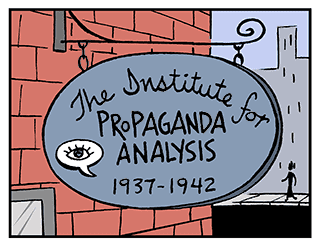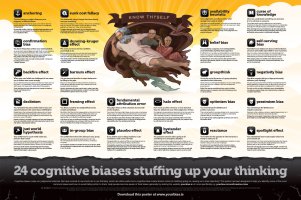Grapelander
Member
See this link for detailed explanations: MASTER LISTS: Propaganda ~ Logical Fallacies
Robert Allen & Lorne Greene (of Bonanza fame): The Propaganda Game
A. Techniques of Self-Deception
1. Prejudice
2. Academic Detachment
3. Drawing the Line
4. Not Drawing the Line
5. Conservatism, Radicalism, Moderatism
6. Rationalization
7. Wishful Thinking
8. Tabloid Thinking
9. Causal Oversimplification
10. Inconceivability
B. Techniques of Language
1. Emotional Terms
2. Metaphor & Simile
3. Emphasis
4. Quotation Out of Context
5. Abstract Terms
6. Vagueness
7. Ambiguity
8. Shift of Meaning
C. Techniques of Irrelevance
1. Appearance
2. Manner
3. Degrees & Titles
4. Numbers
5. Status
6. Repetition
7. Slogans
8. Technical Jargon
9. Sophistical Formula
D. Techniques of Exploitation
1. Appeal to Pity
2. Appeal to Flattery
3. Appeal to Ridicule
4. Appeal to Prestige
5. Appeal to Prejudice
6. Bargain Appeal
7. Folksy Appeal
8. Join the Bandwagon Appeal
9. Appeal to Practical Consequences
10. Passing from the Acceptable to the Dubious
E. Techniques of Form
1. Concurrency
2. Post Hoc
3. Selected Instances
4. Hasty Generalization
5. Faulty Analog
6. Composition
7. Division
8. Non Sequitur
F. Techniques of Maneuver
1. Diversion
2. Disproving a Minor Point
3. Ad Hominem
4. Appeal to Ignorance
5. Leading Question
6. Complex Question
7. Inconsequent Argument
8. Attacking a Straw Man
9. Victory by Definition
10. Begging the Question
Stephen Downes' Guide to the Logical Fallacies
Fallacies of Distraction
False Dilemma
Argument From Ignorance (argumentum ad ignorantiam)
Slippery Slope
Complex Question
Appeals to Motives in Place of Support
Appeal to Force (argumentum ad baculum)
Appeal to Pity (argumentum ad misercordiam)
Appeal to Consequences (argumentum ad consequentiam)
Prejudicial Language
Appeal to Popularity (argumentum ad populum)
Changing the Subject
Attacking the Person (argumentum ad hominem)
Appeal to Authority (argumentum ad verecundium)
Anonymous Authorities
Style Over Substance
Inductive Fallacies
Hasty Generalization
Unrepresentative Sample
False Analogy
Slothful Induction
Fallacy of Exclusion
Fallacies Involving Statistical Syllogisms
Accident
Converse Accident
Twenty-Five Ways To Suppress Truth: The Rules of Disinformation
by H. Michael Sweeney
Twenty-Five Rules of Disinformation
1. Hear no evil, see no evil, speak no evil
2. Become incredulous and indignant
3. Create rumor mongers
4. Use a straw man
5. Sidetrack opponents w name calling, ridicule
6. Hit and Run
7. Question motives
8. Invoke authority
9. Play Dumb
10. Associate opponent charges with old news
11. Establish and rely upon fall-back positions
12. Enigmas have no solution
13. Alice in Wonderland Logic
14. Demand complete solutions
15. Fit the facts to alternate conclusions
16. Vanish evidence and witnesses
17. Change the subject
18. Emotionalize, Antagonize, and Goad
19. Ignore facts, demand impossible proofs
20. False evidence
21. Call a Grand Jury, Special Prosecutor
22. Manufacture a new truth
23. Create bigger distractions
24. Silence critics
25. Vanish
Eight Traits of The Disinformationalist
1. Avoidance
2. Selectivity
3. Coincidental
4. Teamwork
5. Anti-conspiratorial
6. Artificial Emotions
7. Inconsistent
8. Newly Discovered: Time Constant
Robert Allen & Lorne Greene (of Bonanza fame): The Propaganda Game
A. Techniques of Self-Deception
1. Prejudice
2. Academic Detachment
3. Drawing the Line
4. Not Drawing the Line
5. Conservatism, Radicalism, Moderatism
6. Rationalization
7. Wishful Thinking
8. Tabloid Thinking
9. Causal Oversimplification
10. Inconceivability
B. Techniques of Language
1. Emotional Terms
2. Metaphor & Simile
3. Emphasis
4. Quotation Out of Context
5. Abstract Terms
6. Vagueness
7. Ambiguity
8. Shift of Meaning
C. Techniques of Irrelevance
1. Appearance
2. Manner
3. Degrees & Titles
4. Numbers
5. Status
6. Repetition
7. Slogans
8. Technical Jargon
9. Sophistical Formula
D. Techniques of Exploitation
1. Appeal to Pity
2. Appeal to Flattery
3. Appeal to Ridicule
4. Appeal to Prestige
5. Appeal to Prejudice
6. Bargain Appeal
7. Folksy Appeal
8. Join the Bandwagon Appeal
9. Appeal to Practical Consequences
10. Passing from the Acceptable to the Dubious
E. Techniques of Form
1. Concurrency
2. Post Hoc
3. Selected Instances
4. Hasty Generalization
5. Faulty Analog
6. Composition
7. Division
8. Non Sequitur
F. Techniques of Maneuver
1. Diversion
2. Disproving a Minor Point
3. Ad Hominem
4. Appeal to Ignorance
5. Leading Question
6. Complex Question
7. Inconsequent Argument
8. Attacking a Straw Man
9. Victory by Definition
10. Begging the Question
Stephen Downes' Guide to the Logical Fallacies
Fallacies of Distraction
False Dilemma
Argument From Ignorance (argumentum ad ignorantiam)
Slippery Slope
Complex Question
Appeals to Motives in Place of Support
Appeal to Force (argumentum ad baculum)
Appeal to Pity (argumentum ad misercordiam)
Appeal to Consequences (argumentum ad consequentiam)
Prejudicial Language
Appeal to Popularity (argumentum ad populum)
Changing the Subject
Attacking the Person (argumentum ad hominem)
Appeal to Authority (argumentum ad verecundium)
Anonymous Authorities
Style Over Substance
Inductive Fallacies
Hasty Generalization
Unrepresentative Sample
False Analogy
Slothful Induction
Fallacy of Exclusion
Fallacies Involving Statistical Syllogisms
Accident
Converse Accident
Twenty-Five Ways To Suppress Truth: The Rules of Disinformation
by H. Michael Sweeney
Twenty-Five Rules of Disinformation
1. Hear no evil, see no evil, speak no evil
2. Become incredulous and indignant
3. Create rumor mongers
4. Use a straw man
5. Sidetrack opponents w name calling, ridicule
6. Hit and Run
7. Question motives
8. Invoke authority
9. Play Dumb
10. Associate opponent charges with old news
11. Establish and rely upon fall-back positions
12. Enigmas have no solution
13. Alice in Wonderland Logic
14. Demand complete solutions
15. Fit the facts to alternate conclusions
16. Vanish evidence and witnesses
17. Change the subject
18. Emotionalize, Antagonize, and Goad
19. Ignore facts, demand impossible proofs
20. False evidence
21. Call a Grand Jury, Special Prosecutor
22. Manufacture a new truth
23. Create bigger distractions
24. Silence critics
25. Vanish
Eight Traits of The Disinformationalist
1. Avoidance
2. Selectivity
3. Coincidental
4. Teamwork
5. Anti-conspiratorial
6. Artificial Emotions
7. Inconsistent
8. Newly Discovered: Time Constant







